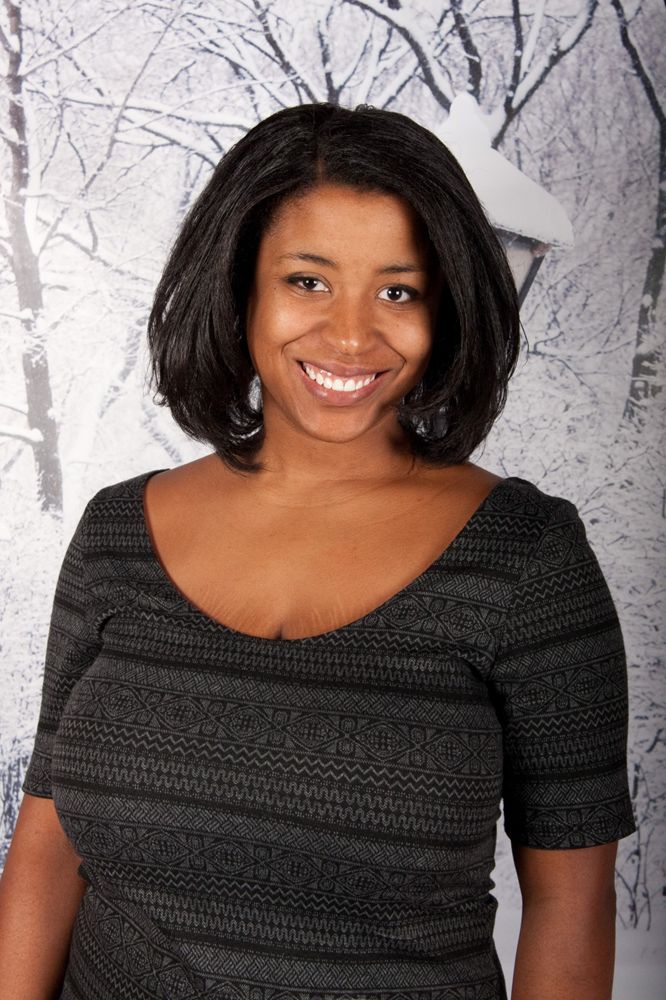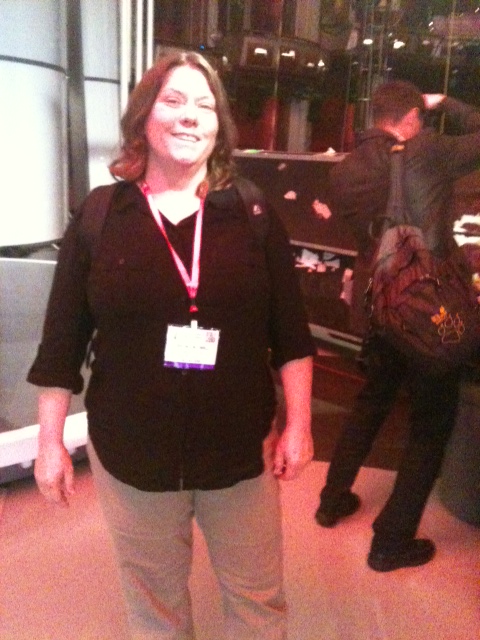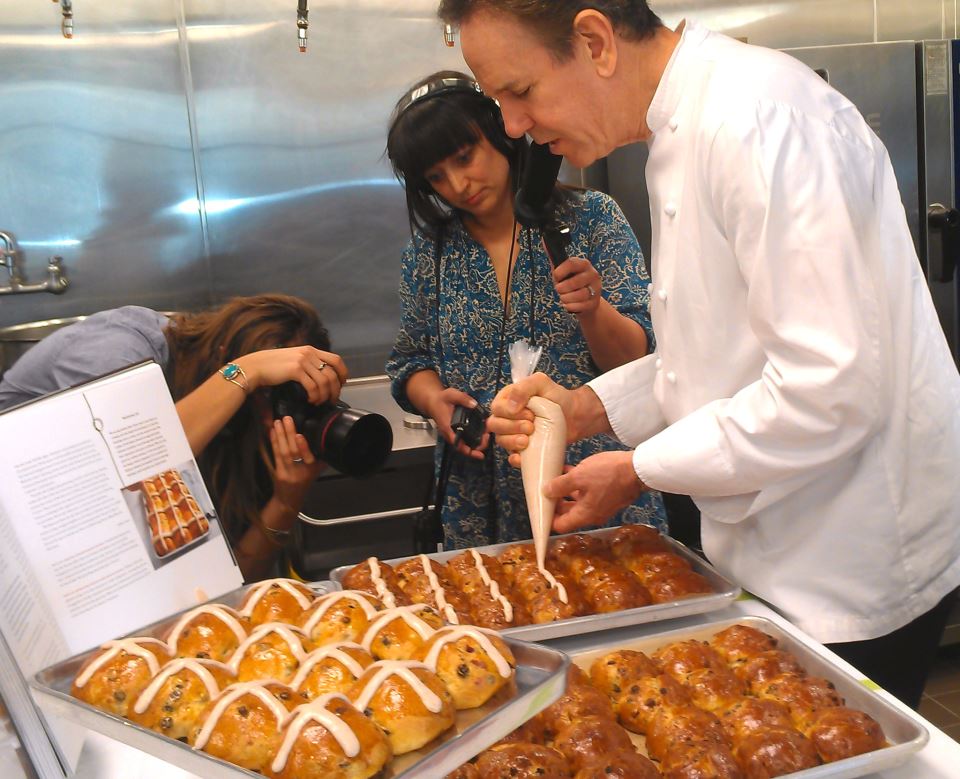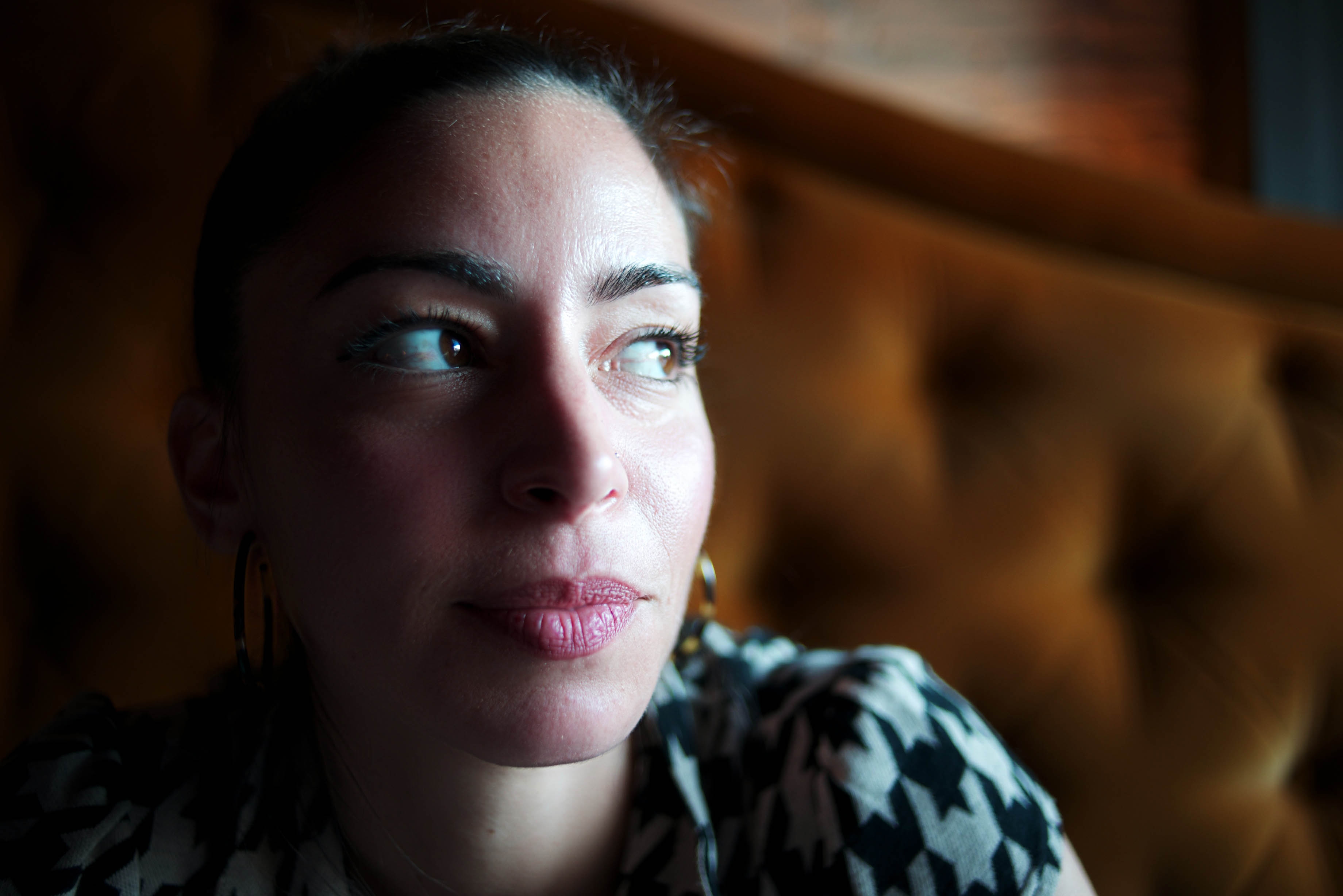SoundGirls interviews the women who work at NPR West about their roles with the company and their experiences in broadcasting.
Priska Neely is an Assistant Producer for All Things Considered weekend shows. After studying broadcast journalism at NYU, she completed internships with local public radio stations and StoryCorps before landing an internship with All Things Considered in Washington, D.C. Following her internship, Neely remained at NPR as an editorial assistant working on Talk of the Nation, a live, national call-in show, until it went off the air in 2013. That same year, Priska moved to NPR West to begin a new position as part of the weekend staff for All Things Considered. In her role on the show, she pitches story ideas, book guests, edits interviews for air, and shares directing duties. She occasionally reports feature pieces, as well.
For more than eighteen years, Marcia Caldwell has worked for NPR as a Broadcast and Recording Technician, but she started in radio by accident. Because of her low voice, she was asked to be a DJ at her college station at the University of Redlands. After her first overnight shift, she thought, “What a boring job!” but she really liked the technical side of things. She eventually transferred to Long Beach State, where she got a work/study job as a Production Assistant at KLON (now KKJZ) and learned all about radio production. Following graduation, Marcia was hired by the American Public Media program Marketplace to engineer the daily national show. She then went on to become Operations and Production Director at KPFK, where she handled live music set-ups and hosted her own show, “Pandora’s Music Box” (featuring music by women “around the world, around the centuries, and around the block.”) Since coming to NPR, Marcia has worked all over the country, engineering live remote broadcasts of Wait Wait… Don’t Tell Me! And Talk of the Nation/Science Friday, in addition to supporting live coverage from New York after 9/11 and from New Orleans, following Hurricane Katrina. She has served as Technical Director for Morning Edition and is currently a Drive Engineer for All Things Considered shows on Saturdays and Sundays.
Nina Gregory got her start in the medium in college radio at UCLA in the last century, where the station broadcast to the dorms and student union. Needless to say, almost no one listened, at least not willingly. After college, she worked in various jobs, including post-production of movies, production of commercials and music videos, and as a freelance and staff writer for almost a decade. She wrote for music and lifestyle magazines covering everything from cars to culture, personal finance to video games. After coming to realize her dream job was in public radio, she attended the Graduate School of Journalism at Columbia University, where she also gathered some valuable journalism skills, too. Following school, she got a job on NPR’s Morning Edition, where her first night of work was on Christmas Eve with co-host Renee Montagne, the best Christmas present she could imagine. She worked alongside Renee on the overnight for six years, then moved to a Morning Edition daytime shift for a few years, before recently becoming an Editor on the Arts Desk.
Shereen Marisol Meraji is a native Californian with family roots in Puerto Rico and Iran. A graduate of San Francisco State with a BA in Raza (Latino) studies, Shereen’s first job in college involved radio journalism, and she hasn’t been able to shake her passion for storytelling since. Today, she finds the humor and humanity in reporting on race for the NPR Code Switch team. Her stories center on the real people affected by the issues, not just the experts and academics studying them. The best career advice Shereen received was from veteran radio journalist Alex Chadwick, who said, “When you see a herd of reporters chasing the same story, run in the opposite direction.” She’s invested in multiple pairs of running shoes and is wearing them out reporting for Code Switch.
SoundGirls: What is involved in developing a story for air from start to finish?
Priska: It depends on the type of story, but for booking an interview with a guest and a host, the process is: pitching a story, booking the guest (which may mean pre-interviewing a bunch of people to find the right person), getting that person into a studio or finding another way to get a quality recording, writing questions with the host, sitting in during the interview, then editing it down to time, writing an introduction, recording the introduction and then it’s on the air!
Nina: There are several types of stories: host interviews, reporter stories, and various forms in-between that use tape and bits of writing to tie it together. Because we’re in the news business, a good story first has to have a news peg, a reason we’re telling it now. Next, it has to be compelling to a national audience – whether it’s a profile of a formidable musician or a postcard from a local event, it has to offer something of universal interest. Often, the listener’s interest is earned through great tape, people who tell compelling stories or access to a place listeners don’t normally get to go to. My favorite stories capture a world, whether deep in the mind of a writer, backstage at Lincoln Center or the wild ramp festival in West Virginia. We take listeners someplace and tell them something interesting. So: good story, good tape, national in scope and newsy.
Shereen: A great story starts with an idea that you’re totally curious about or a question you have to know the answer to. Be curious about the world around you. Those questions you have about why things happen and why people do what they do, write them down because those questions are the seeds that will grow into beautiful stories. Then you’ve got to dig in research, research, research! Find the people who can answer your question and develop a pitch that you can share with an editor. Next, report and write. And finally, edit, edit, edit the story into that perfect informative and entertaining piece of journalism.
SoundGirls: What is the typical time frame to develop a story for air?
Priska: This really depends. Our work week goes from Wednesday to Sunday, and our show airs on Saturday and Sunday. We have a pitch meeting on Wednesday, most interviews take place on Thursday and Friday, and then they air that weekend. Some stories that are more in-depth or have a specific peg may have a longer production window. Generally, you pitch something in the meeting on Wednesday, and it’s on the show that weekend.
Nina: There is nothing typical in the news. A news story can break and turn around in minutes – it can even be live – or it can take months or years for a story to come together. For example, a profile of Iggy Pop that I edited took me almost two years to do because he was very hard to book. There are interviews I’ve been chasing for going on seven years (it’s true, and I’m still working on them). The only rule is that features take longer, and breaking news should be fast. Otherwise, it’s not news; it’s olds.
Shereen: It depends on the story. Some stories are investigative and will take a long time (months even), and you have to make formal requests for information and data. Others are based on a news event that is just taking place, and you have to run to the story, synthesize the information, and report on it that very day.
SoundGirls: How many departments are involved?
Priska: On our show, some story ideas come from producers who go on to book the guests. Other times, we need a story to be reported from somewhere else in the country or the world. That’s when the National Desk or the Foreign Desk gets involved with assigning and editing the story. Otherwise, things are pretty much handled in-house. For breaking news on weekends, there are editors and duty reporters who assign stories.
Nina: It depends. It can be a one-woman-band out in the wilds recording her own sound, writing her own copy and pulling her own tape. She might even lay it up and mix it herself. There will be editors, producers, show staff, desk staff, and engineering staff called on – so it could be a lot or a little, depending on the skill of the reporter and the quality of the tape.
Shereen: At NPR, reporters have “beats”: areas of expertise (mine is race, culture, and ethnicity). If I’m working on a story that will span various beats (say, education, business, or health) sometimes, I have to involve those editors in my process. I also work on different media platforms, so I’m usually working with people who are responsible for web stories and other people responsible for producing radio journalism.
SoundGirls: How much are the on-air personalities involved in the development of the story?
Priska: When Arun [Rath, weekend host of All Things Considered] pitches a story, he is very involved. If it’s something the producer pitches, the producer collaborates with the host on the frame of the story. Each host is different.
Nina: When I worked on Morning Edition, it was vital to have the host involved, as I was editing host interviews. I’d generally pitch the host or the show’s executive producer an idea, and then I would book it and collaborate with the host to create the interview (writing the questions and editing the interview once it was taped). It’s a lot of work, and you can’t do good interviews without a good host. I was lucky because I got to work with the best hosts in the business. It takes great writers, excellent news judgment and a keen understanding of what makes “good tape.” The entire show staff is a very creative and super intelligent group, and our best work is highly collaborative.
SoundGirls: On the technical side, what skills are needed?
Marcia: The skills needed to do this job are attention to detail, good listening skills and a desire to figure things out. Most of the technical things I do I have learned on my own, by reading manuals or just playing around with the equipment or program. When I started, everything was analog, and I have experienced the switch over to a digital world. No one really understood everything, so we all learned together. I approach my job as a musician – I try to make things sound beautiful and easy to listen to!
SoundGirls: What is a typical day like for the sound engineers who work on shows? What are they responsible for?
Marcia: A Drive Engineer (DE) is the operator of the mixing board during the live show. The show has a series of elements (live host, pre-recorded reports, music beds, funders and promos of other shows) that have to be heard at very exact times, called POSTS. We strive to always “hit the post,” but not “miss the post.” The volume of each element is controlled by the DE, which involves pre-listening to a source in CUE to determine its relative loudness compared to what is currently on the air and to adjust accordingly. This is where the “art of mixing” is. There is a director who is also watching the clock and is responsible for hitting posts, as well. They will tell the DE when to do the next thing and what the next thing is.
The reason for these exacting time posts is that the stations broadcasting the program need to cut into the program so that the local hosts can convey information that is important to their listeners. We provide a second or two between segments to allow for them to cut away at a certain time and to know when they can rejoin the broadcast seamlessly. This way the NPR show has a nice, local presence so that the stations can serve their audiences.
Sometimes things don’t go as planned, and this is where experience is really important because it is easy to panic. There are many options when something doesn’t go right, and choosing the best way and doing it quickly is where the DE can save the day. If there are errors in the broadcast, the DE has to write a Discrepancy Report detailing the issue and how it was resolved. This message goes out to all of NPR and all of the stations so that everyone knows what happened and why. Sometimes the host will “bust the post,” and the DE may have to cut the microphone while the host is still going. This usually happens when the next element is a funder, which has to be aired at a certain time or NPR has to refund the underwriters, who have paid for the spot. It is always scary to make that split-second decision, but the team of DE and director make it together.
Prior to the show, the Technical Director or the Backup Engineer listens to all of the show’s pre-recorded elements with an ear for quality control. We listen for unwanted background noise, unintelligibility, or loudness changes that could distract the listener. We use various tools to make these changes, such as EQ (equalization) or processing tools like Compression or a DeEsser. We also have an audio restoration program (Isotope) which can fix many issues. The production staff will ‘lay-up’ the sound elements of a story, and they will sometimes alert us to an audio problem, as well. We work very closely with the producers to solve problems before a segment airs.
SoundGirls: What type of trade school or traditional college program should people interested in working for NPR – both from a journalist side to technical side – should people pursue?
Priska: People have come to us from lots of different places. Almost everyone I work with started as an intern. In order to get an internship at NPR, it’s very helpful to get experience with a local member station. That shows that you understand how the public radio system works, and you will develop references, who can advocate for you. That type of networking is probably more valuable than a degree. We have people who have all sorts of college or grad school backgrounds – many did not study journalism.
Nina: College, for sure. You don’t have to study journalism, study something that interests you. You should show an interest in journalism, though, working at the school radio station or newspaper. Work for a member station if you can. I went to grad school because I wanted to learn the craft of radio journalism, and it was a great decision for me as I had been a freelancer for many years and developed many bad habits I got to ‘unlearn.’ I do recommend working – anywhere – before going to j-school if that’s a choice you make. You can wait tables or work retail, it doesn’t matter, but make sure you want to do this before spending the money on grad school. I recommend that you love working with sound if you want to work at NPR!
Shereen: If you’re not curious about the world, no trade school or college program will make you into a journalist. Some of my colleagues went to journalism school, but I did not. I, however, did take a lot of ethnic studies courses in college which prepped me for reporting on changing demographics and race relations.
Marcia: If you want to work in audio engineering, I don’t think going to a trade school or getting a technical degree is really necessary, but it is nice to know that stuff. Save your money and find a place where you can get your hands dirty like doing your own podcast, or learn a digital audio editing program. Join or help a band by mixing their PA system. It’s all signal flow. My last bit of wisdom is “It isn’t that hard to figure out, because a man designed it.”
SoundGirls: What is the culture like for women working at NPR?
Priska: I think the culture is pretty good because there are lots of women here. I do think it is important for women to advocate for themselves and make their career goals known. One very helpful piece of advice I got as an intern was: Never assume anyone knows you’re interested in anything.
Nina: NPR was essentially founded by women. We call them the Founding Mothers. That’s not to say there aren’t still battles that are being fought, but from my experience, it’s been an excellent place to work.
Shereen: NPR’s better than most workplaces, but there’s plenty of room for more growth. There are women in upper management and lots of women doing reporting and editing work for the network. But we still need to ask for what we deserve as far as pay and work opportunities; they won’t come unless you ask, so don’t be afraid to speak up.
Marcia: Working at NPR, for the most part, is fun and exciting. The people who work here are smart and have a lot of passion for their contribution to making radio that will make a difference in the world we live in. I have found the other techs to be pretty supportive, yet competitive with each other. It is up to each one of us to strive on our own to understand new technology and become a “go-to person” for others. Training is usually “learn while you earn,” but management is beginning to offer more training recently. I will point out, however, that currently there are no women in any Audio Engineering supervisory or management positions in, so there is more work to do here on gender equality.



